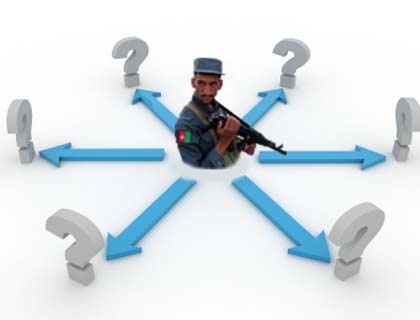Never before throughout the past ten years did the situation in Afghanistan look so hopelessly grim for both the people and the government, as well as, the international community. The assassination of the High Peace Council chief, Burhanuddin Rabbani, has casted a heavy aura of uncertainty over what the future has in store for an Afghanistan that is caught in the brutal whirlwind of history.
Conspiracy theories by now abound as to who was behind the high-profile assassination. Some blame the Taliban while others implicate the Haqqani group. Some put it at the feet of Pakistan and some others go to the extent of pointing fingers at the U.S. and the NATO.
All the available evidence, of course, point towards the Taliban. They, by this horrific act, have proved to all that, by nature, savagery and violence are built into their very souls. The marriage of Taliban and mindless violence, of Taliban and naked barbarity is an eternal one.
For apologists of Taliban, this is their very Achilles' heel; whenever they have come out in support of Taliban, the militant group's raw and horrendous acts of brutality have belied the apologists' duplicity.
For the confused and seemingly hapless people of Afghanistan, the news of the event was an unmitigated shocker. The initial disbelief gave way to a strong yet muted sense of outrage and revulsion. The overwhelming sense of anger - as has been the case over the past three decades and more - remained suppressed for the majority of Afghans as the people of this land have learnt to gobble up and live with whatever misery and torment that have become part of their lives.
For the government of Afghanistan, the loss is irreparable. For President Karzai, his one-year old initiative of peace and reconciliation process has received a major setback, throwing into disarray the painstaking work of seeking out contacts and building of gradual confidence with various factions of the insurgency that the Peace Council had managed to do.
To put a new person in the place of the Late Burhanuddin Rabbani would mean having to start anew and retracing the steps he had so meticulously explored during his one year chairmanship of the Peace Council.
For President Karzai, this huge loss comes on the heels of the assassination of his brother in Kandahar, whom he counted on for maintaining the delicate power balance and his support base in that critical region.
The loss of Ahmad Wali Karzai was enough to upset the very foundations of Mr. Karzai's presidency. The loss of Burhanuddin Rabbani as the chief of the High Peace Council, on one hand, bogs down the President's peace initiative and, on the other, works to instigate the simmering ethnic tensions in the country and thus further destabilizing the country, its politics as well as the government of President Karzai.
Unfortunately, the odds are overwhelmingly loaded against the peace and reconciliation process pursued by the government of President Karzai and the international community. The nature of the conflict in Afghanistan; the nature and ideology of the core of the insurgency including the Taliban; the unfavorable domestic, regional and global conditions all work to render the peace and reconciliation process futile as long as bold and broad steps are not taken to address these wide-ranging issues.
The dead-end is obvious; it is certainly within the ability of no single participant to break open the dead-end. Genuine cooperation among all the stake-holders on solving the conflict is not forthcoming. Worse, the two countries that can have the most decisive positive impact in Afghanistan, namely the U.S. and Pakistan, are bitterly at each other's throats. In such a situation, the conflict will continue; the festering wounds that feed the conflict are opened and re-opened. The vicious cycle of war and violence continues to turn, unabated.
Afghanistan caught in the U.S.-Pakistan crossfire
The increasingly volatile relations between the U.S. and Pakistan, far from helping matters here in Afghanistan, is destabilizing to Afghanistan and reduces the chances of success against the Taliban. In the latest incident, Hina Rabbani Khar, Pakistan's Foreign Minister, as widely reported, has lashed out at the U.S., warning against further U.S. public criticisms of Pakistan and its security agencies. The war of the titans between the U.S. and Pakistan, as I have maintained for long, is set to only deteriorate further in the coming months and years. Afghanistan: fasten your seat belts!
The U.S. criticism of Pakistan and its security agencies might have a measure of truth in them, but, the U.S., by its public criticisms of Pakistan, secretly and shrewdly pursues a sinister agenda of targeting and subverting the Pakistani government and its security agencies.
Remember Iraq in 1990's? Remember Libya in 1990's and 2000's? Remember Iran since 1979? Pakistan, unfortunately, is turning into another target in an unprecedented American and the global elites' quest for unbridled hegemony in this part of the world. I wonder if our policy makers are taking note of this very important development that is gradually unfolding in our neighborhood.
The U.S.'s larger regional ambitions hinder and to a great extent go against the cause of accomplishing success in Afghanistan. We are very thankful to the government of the United States for its overwhelming support of Afghanistan all these years; for its great sacrifice in both blood and treasure but, on the U.S. part, ruthlessly pursuing regional ambitions at the cost of having a stabilized and peaceful Afghanistan is hardly what Afghanistan needs now.
The Afghan leadership, its policy-makers and leaders need to be vigilant and aware more than ever. Transforming Afghanistan's moribund diplomatic machinery into an active and effective negotiator of Afghanistan's vital interests is an acute necessity. As the regional conditions are changing and the war in Afghanistan is set to linger for long, Afghanistan cannot afford to be unwise.

